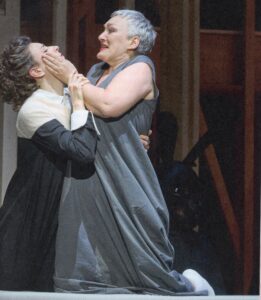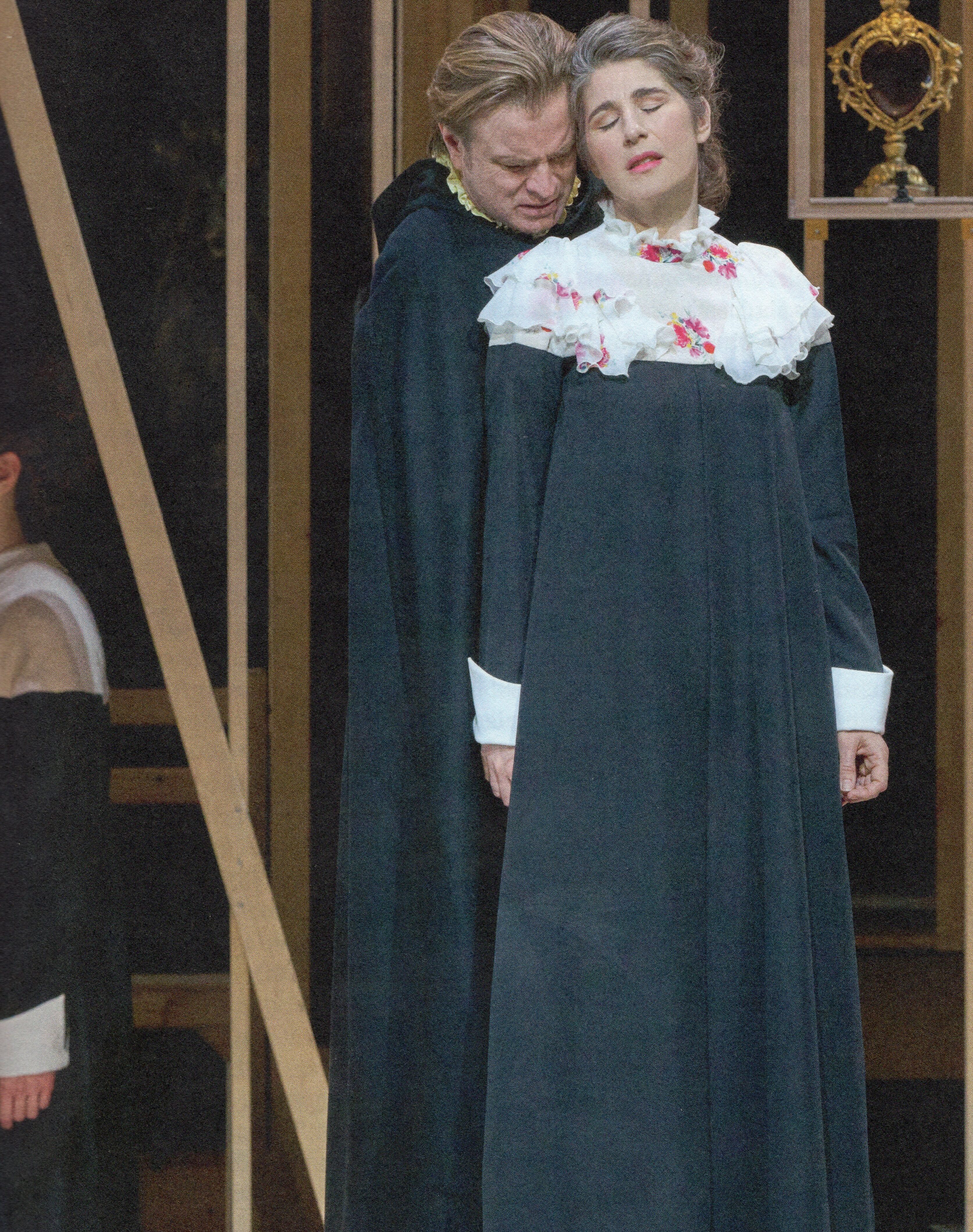In the opening scene, Chevalier, Blanche’s brother, (tenor Benard Richter), sings lyrically of Revolutionary France in the throes of revolution; mobs stopping carriages, murder, and anarchy. His father, the Marquis, (Michael Kraus) is frightened for Blanche, given the horrifying circumstances of his wife’s death. But it’s not Blanche’s security but her mind that Chevalier is worried about. He sings of the terrible look of anxiety he sees on her face everyday. This ‘proud and noble young woman’ yet turns up at the Carmelite convent, telling the Mother Superior, Madame de Croissy, she wants to lead a ‘heroic life’: she’ll renounce everything if only God will restore her honour. Croissy (Michaela Schuster) caustically replies ‘a convent is where people come to pray‘; she’s forever listening to women ‘caught up in themselves.’ Blanche had illusions, but waiting to be relieved of them, asked for her religious name, Sister Blanche of the Agony of Christ.
Schuster’s impressive mezzo – from Hansel and Gretel’s witch, to Lohengrin’s Ortrud- now unrecognizable, cropped, white-haired- is harrowing, as the Prioress in such pain, she has to beg for herbal remedies that no longer work. Yet humble, human, her chair is ‘no symbol of office.’
As Blanche, Nicole Car, recently the love-sick Tatanya in ‘Eugene Onegin’, pleads she has no refuge more. This Order is no refuge, Croissy counters. To a bleating cor-anglais solo, I am alone, Mother, without any consolation. Car, a wonderfully expressive soprano, excels in a convincing, heart-rending performance as the nun from a rich family, to which she’ll return, (but who finally dies for her faith.)
 Meanwhile Croissy, who asks for Blanche by her religious name, has to beg for another palleative: she can’t bear to ‘face her daughters looking like this.’ Croissy later sings of her dream, in a vision, the Carmelite Order was destroyed. In the third Scene, sister Constance (the beautiful soprano Maria Nazarova) believes she and Blanche suffer the same fate. She sings, perhaps we die for each other.
Meanwhile Croissy, who asks for Blanche by her religious name, has to beg for another palleative: she can’t bear to ‘face her daughters looking like this.’ Croissy later sings of her dream, in a vision, the Carmelite Order was destroyed. In the third Scene, sister Constance (the beautiful soprano Maria Nazarova) believes she and Blanche suffer the same fate. She sings, perhaps we die for each other.
The dying Croissy has entrusted her deputy Marie (Eve-Maud Hubeaux) to put Blanche under her care. Hubeaux’, another impressive performance, but the Order- not to be separated- sung and enacted, the cast is outstanding.
‘A man at the door on horseback’ insists on seeing Blanche, before he leaves the country. Car stands there speechless. Their father, knowing the Revolution is turning against religion, wants her to leave the convent. Her change shocks Chevalier. ‘Why is she speaking, so unnaturally, sounding forced.’ Car is perfect; becalmed, suppressed emotions. She sings, she’s not used to ‘the happiness of living without fear.’ Chevalier retorts, ‘ a lot of women would have envied what she had.’ – She, ‘do you really think it was fear that kept me hear? Where I am, nothing can hurt me.’ Poulenc’s score has a spiritual quietude. The conflict of belief is represented by shrill brass, drums and other percussion: between inner peace and the brutal violence of the outside world.
Of the cast’s few male singers, Thomas Ebenstein’s father Confessor reminds us of Blanche’s isolation from worldly reality. As the Convent’s Chaplain, he’s been removed from office by the Revolutionaries. What will he do, asks one Commissar. They’ll kill him. ‘The French are afraid, and fear infects everyone, like cholera and the plague’, he sings.
For France to keep its priests the Carmelites must lay down their lives, sings Car ominously. Two Commissars ring, dressed in silver and black culottes, announcing the Convent will be closed, all religious buildings handed over. Poulenc’s music is now quirky, wind instruments satirising the pompous revolutionaries. Front of stage, we see what seems the inside of a chapel trashed. Blanche is given a figurine “the infant king” , which she accidentally drops. A symbolic omen. The stage is silent of music.
For Act 3, the stage is now black, the gold-metallic convent in relief. Blanche’s room is in a state of chaos- books piled up- as she she seems to prepare to leave. Poulenc’s music is strident, urgent, discordant. She’s not ready to follow Chevalier. Too late for that, her security is spiritual. The only person who could have persuaded her, her father, had his head cut off a few days ago! (Now Poulenc’s strident, jabbing chords.)
The Tribune reads out a list of the banned Carmelites. Nuns have lined up, in white blouses, gold skirts. ‘No one can take from us a freedom we gave up a long time ago.‘.- Have no fear, daughters, be calm, sings Hubeaux’s redoubtable Marie. The Revolutionary Tribune lists the Carmelites’ charges; of “infamous plots, shed in the name of heaven”, proclaiming that the above are sentenced to death.
 Mother Marie, (acting Mother Superior) solemnly places her daughters under the vow of obedience for the last time. Hubeaux sings movingly, she cannot bear for them to die without her. The Chaplain (Ebenstein) tells her of the sentence. She wants to join the Sisters, but he holds her back: ‘God decides who he will preserve.’
Mother Marie, (acting Mother Superior) solemnly places her daughters under the vow of obedience for the last time. Hubeaux sings movingly, she cannot bear for them to die without her. The Chaplain (Ebenstein) tells her of the sentence. She wants to join the Sisters, but he holds her back: ‘God decides who he will preserve.’
Madame Lidoine (Maria Motolygina) is responsible for the sisters in her care, now ‘normal citizens’ after the dissolution of the Convent. Mother Marie visits Blanche, returned to her father’s house, seeking refuge as a maid. She refuses Marie’s invitation to come with her, Blanche, painfully, in self-reproach, lamenting her life of fear.
The stage is filled with mist. On the top level of the ‘fortress’, saintly figures in black, embelished with gold. The nuns en masse lie on the lower stage, like concentration camp victims, marked out to be murdered. The ‘Angels’ sing SALVE, Regina… Ad te clamamus …And the stained-glass window high above shows a video of (apparently) The Last Judgement. O clemens, o pia ..The Sisters go to the scaffold singing, the choir reduced one by one, the last being Blanche. (The metallic, slicing guillotine is incorporated in Poulenc’s score.)
Bertrand de Billy, conductor of Vienna State Opera Orchestra and Choirs, was greeted with a roar of applause, after an enthousiastic reception for the entire cast. Fuchsberger’s largely woman’s production has succeeded in re-interpeting Poulenc’s 20th century masterpiece, affirming personal belief and religious faith against totalitarianism. Never more relevant nearly a hundred years on. PR 21.5.2023
Photos: Eve-Maud Hubeaux (Mother Marie), Michaela Schuster (Madame de Croissy); Maria Motolygina (Madame Lidoine) © Michael Pöhn/ Wiener Staatsoper
Featured Image © Ashley Taylor/ Wiener Staatsoper

